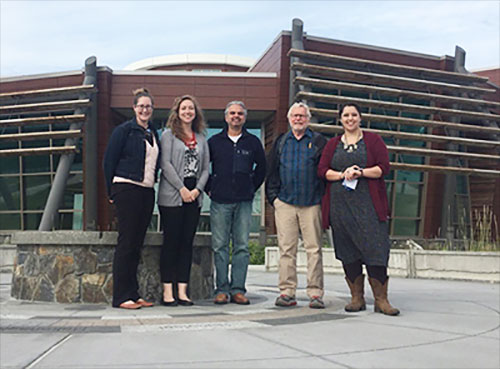
SECOND PHASE OF EPIGENETICS STUDY TO COMMENCE IN HOONAHResearch to focus on Hoonah residents
September 25, 2019
The study, Epigenomic Effects of European Colonization on Alaska Native Peoples by the Malhi Molecular Anthropology Lab at the University of Illinois in Urbana-Champaign, is seeking to combine advances in technology with community-based research to study the biological basis shaping adverse health outcomes resulting from the many changes since European contact with Indigenous peoples of the Americas. The first phase of research for the project was completed June 17-21, 2019, in Juneau. In order to accommodate additional volunteers, two days have been added in Juneau, Sept. 26-27, 2019. The team will start phase two in Hoonah Oct. 1-4, 2019.
European colonization had a profound, global impact in terms of its demographic, environmental and genetic effects on populations worldwide. The social, economic and demographic effects of European colonization are well studied, but the biological consequences are less well understood, wrote Ripan Malhi, principle investigator and professor of genomic biology at the university. “This is important because the effects of European colonization and the chronic stress generated by changes from traditional lifestyles are hypothesized to contribute to health disparities and psychosocial stress of indigenous peoples today,” Malhi wrote. Participants will be asked to give a blood sample and take a survey, which will include questions about general well-being, demography, community events participation and traumatic experiences. Due to the sensitive nature of the survey questions, counselors from Southeast Alaska Regional Health Consortium (SEARHC) will be on hand if a participant feels the need to pause the survey to talk to them. The team will also ask community members about their participation in cultural events, eating traditional foods and engagement in subsistence activities. All of these things may modify or buffer against any potential DNA effects seen with historical trauma. All individual data will be anonymous, and the results of the study will be presented to the community. Individual data results will not be released and DNA samples will be destroyed at the conclusion of the study. Volunteers will be given a $50 gift card for their time. Tlingit people living in Hoonah who are 18 years or older and interested in participating Oct. 1-4 should contact Niccole Williams at 907-945-3545, nwilliams@hiatribe.org. Those who wish to participate in Juneau Sept. 26-27 should contact SHI’s Culture and History Director Chuck Smythe at chuck.smythe@sealaska.com, 907.586.9282 or Mason Auger at mason.auger@sealaska.com, 907.586.9229.
Edited by Mary Kauffman, SitNews
Source of News:
|
||||
